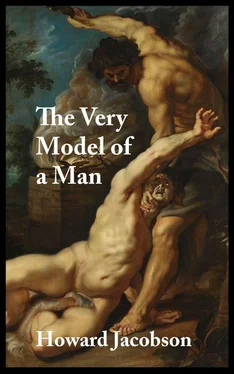So I lacked example and training. And I lacked will. Any sort of manufacture that did not in some way diminish or deny God’s plan for nature exhausted me. Making mutants in my garden was energising; it filled me with the conviction of noble purpose: nothing less than the creation of an antithetic pygmy continent. I would have thrown myself similarly into the construction of a city, a Babel built above the very mud from which my father had been ignominiously pulled. As long as there was labour of contradiction to be done, I believed I could draw on almost limitless reserves of vitality. There was nothing contradictory, though — unless I poisoned them — about cakes. However plain and undelightful, however bitter to the tongue or tormenting to the teeth, a cake was still a celebration of God’s foison. And, not being a poisoner, or a foisoner, I could not find the heart to bake one.
*
Abel looked amused to see me. Seriously amused. He had raked out his altar, laid a new griddle across it, and removed all traces of flesh from its vicinity. A cursory glance told me there were no spots of blood in the dust, no splashes on the nearby rocks. Had he gone down on his hands and knees to wash them off?
I knew who had gone down on her hands and knees to wash him. His skin still hummed from the friction. He was wearing one of his shorter, more skittish tunics — the sort that made angels blush — and I could see red blotches on his thighs, tell-tale signs that somebody loved him.
I was struck again by what a beautiful feature it was, how bewitchingly agonised it made him look — his lips being the same colour as his face. A vermilion mouth might be voluptuous, but a white one whispers of far subtler pleasures, far more excruciating pains.
Well? He was impatient, waiting for me to show him what I carried in my hands, the tray of sacramental cakes, hidden behind my back. Well?
Well? I mimicked, affecting not to understand his curiosity. Where was the harm in a little torment. Especially when the object of it was framed in every pore to be a tormentor himself. Wandering blue eyes. Lips not quite a pair. Skin so fine you believed you could kiss holes in it. Where was the harm. Well? Well what?
Would he approach and pull at my concealing arms? Would he run around and circumvent my surprise? Would we tumble to the ground, laughing? Did we have it in us, we two, to gambol?
He stood still. Colourless. Worn out with my teasing already, although I had hardly begun.
What a lovely evening it is, I said, nodding to the distant hills (because of course I could not point with my baker’s hands behind my back), where God had chosen to flatter our seeing with the prospect of ocean. Ocean the colour of cobalt, and, on some days, if we strained our eyes, surf the colour of milk.
This softening of our landscape had been going on ever since the departure of Saraqael, and the erection of Abel’s altar. We had gone to sleep with the smell of slaughter on the wind and risen to find the desert… lawn. Trees with scabrous, armoured bark vanished in the night; in their place more benign and musical vegetation — oaks and cypresses, as I was content to call them, having lost my zeal for naming at about the time I lost my foreskin. Beetles and reptiles were not to be got rid of so easily — at any time a new species more horrendous than the last would conceive itself out of urine and manure, snorting, crackling, feeding on its own obscene pupae — but gentler creatures began to appear too, crane flies and ladybirds and crawlers of such limpidity that you could see the sun and God’s weightless beneficence through them.
All this because He loved praise.
Hear my prayer, O Lord, sang Abel, twice a day, as the spitting fat and the frankincense rose in an undeviating pillar. O Lord my God, who coverest thyself with light as with a garment: who stretchest out the heavens like a curtain: who layeth the beams of his chambers in the waters — and lo! the drapes of heaven parted with a movement like the billowing of Abel’s vestures when I imagined him God-bound, and waters that had not been there the day before swallowed light as though it were a spring of crystal. Swallowed it and blew it back again, so that one could not say whether the beams fell or rose. There were moments when the sea, or whatever it was that teased us at the far blue edge of vision, seemed to flutter garments of its own, and thence send light streaming to the heavens.
What love between the water and the sky! What orchestrated reciprocity! Moved to melting, my father’s mountain — my mountain — flamed yellow, caught its breath — though we’d been there and knew it had no lungs — and seemed to lose its head for heights.
O Lord, who laid the foundations of the earth — and lo! those foundations themselves swooned and tottered, and it was as if a golden light whose centre was the centre of the world would take us all — sea, sky, mountains, Abel, seasoned carcass, desert laid to lawn, even me — into an embrace of everlasting molten joy.
All this because He loved praise.
My praise — What a lovely evening — was as swoony as I could make it. Totterer’s praise.
Abel said nothing, waiting for me to show my hands.
God’s in his heaven tonight right enough, I sighed. Ecstatic. Transported. Out of my skin.
He turned from me, too pettishly, I thought, for one with oblation and psalm-singing on his mind.
I sighed a few more times — Mmm! Aaah! Well, well, well! — then said abruptly, Do you want these cakes or not?
He kept his head averted. Put them on the griddle, he replied.
In any particular sequence? Surely they don’t just go on the griddle?
Just put them on.
You have to guess which hand.
Come on, he said, the sun is going down.
Does that matter?
It’ll soon be dark.
Does that matter? Does God eat only what He can see? And cannot He see, anyway, as keenly as a cat at night?
This was your idea, he reminded me.
We… ll, I said, rocking the word in both our favours. It was my idea only to show you that I’m not morbid.
Then put them on the griddle.
Guess which hand.
He said nothing.
Pretend I’m my father! Humour me! Guess which hand!
Right.
Wrong!
Left.
Wrong!
This time he looked up and saw me with both arms outstretched and both hands open — behold, empty, a trivial man.
He shook his head, dispelling anger, sorrowing over me, trying to find some way to bring his lips together.
What man do you know — what boy do you know — who likes to be sorrowed over?
I’m joking, I said — but there was no laughter in my voice. I’m teasing you. Look. I have the dough here. Inside my shirt.
He wouldn’t look. Enough jokes.
I mean it, I insisted. I have the dough. A big, fat, round ball of it. Here. Catch.
He swung around and something in the urgency of his movement, something in the clumsy desperation with which he made to catch, clutch, fumble, caused the blood to run cold in my veins. I froze at my extremities, watching him scrabbling in the dirt. Why did he care? What was there in a ball of dough, rolled in anger, thrown with contempt, that ought to have concerned him? A paste ball! What magical properties did it already possess for him, before a fire had been built beneath it, before a blessing had been crooned over it, before it had been smoked and sent on its demeaning errand, that he was prepared to roll around in the dust himself rather than let it lie there unretrieved, unsalvaged, unredeemed?
It is a vile thing to witness agitation, in one you love, caused by a matter you consider trifling. I dropped down with him in the dirt and fought for possession of the ball of oil and flour, besmirched now, blemished, fouled, made forever filthy and unfit. It was difficult not to overwhelm him. He wouldn’t fight me. How could he? I had watched over his cradle, making sure his heart worked.
Читать дальше











